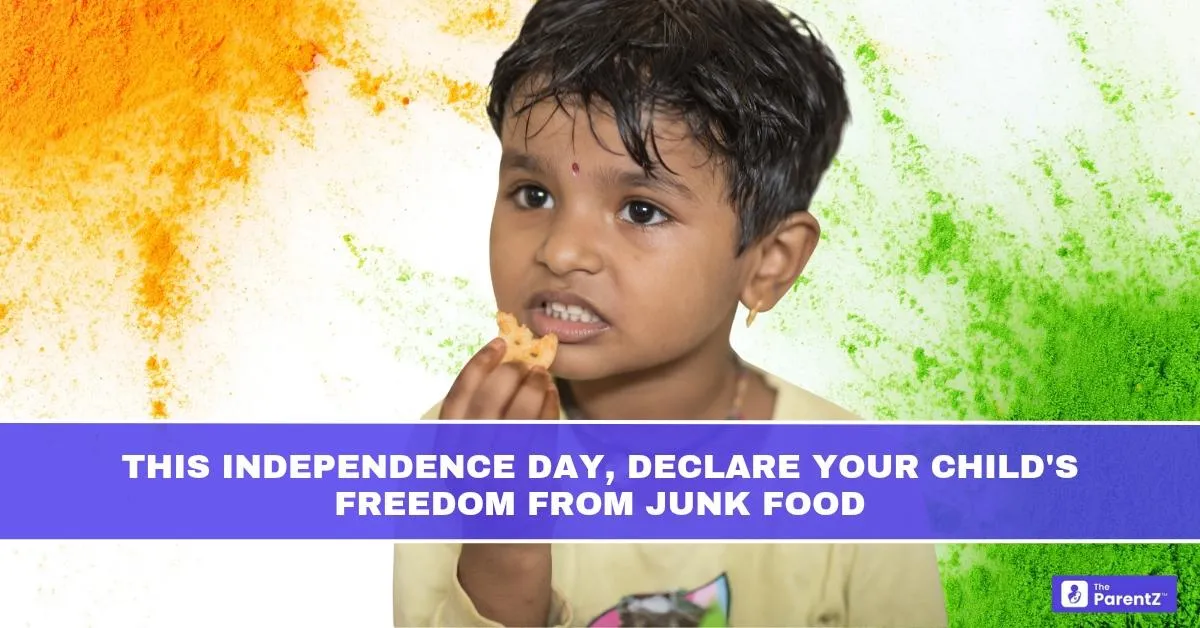India celebrates its hard-won freedom every year on August 15. As we honour the sacrifices of our freedom fighters, this is also a meaningful time to reflect on the freedoms we want our children to experience. While the country is free politically, many children today are not free when it comes to their food choices. They are unknowingly trapped by colourful packaging, sugar-loaded snacks, aggressive marketing, and addictive flavours. As parents and caregivers, it is our responsibility to break these chains.
This Independence Day, let us take a bold pledge to free our children from the grip of junk food and replace it with nourishment, strength, and long-term health.
The Hidden Costs of Junk Food
Junk food is everywhere at schools, birthday parties, supermarkets, and even in tiffin boxes. It includes packaged chips, biscuits, chocolates, sugary drinks, instant noodles, and bakery items that are high in sugar, salt, and unhealthy fats. These items are designed to be tasty but offer little or no real nutrition.
Regular consumption of junk food can lead to several problems in children, such as frequent stomach issues, weak immunity, obesity, poor concentration, mood swings, fatigue, and dental problems. Over time, it also increases the risk of type 2 diabetes, high blood pressure, and early signs of fatty liver disease in adolescents.
According to the Indian Academy of Pediatrics, the rise in non-communicable diseases in children is directly linked to unhealthy dietary patterns that begin early and often go unchecked for years.
Why Do Children Prefer Junk Food
Children are naturally drawn to bright colours, novelty, and strong tastes. Junk food manufacturers exploit this by creating attractive packaging and adding flavours and colours that trigger pleasure centres in the brain. In schools and social settings, children often feel pressure to eat what their peers are eating. When parents are busy, tired, or unwell, packaged snacks seem like the quickest solution to satisfy hunger or prevent tantrums.
Additionally, children may associate junk food with celebrations, rewards, or emotional comfort. This can lead to mindless eating habits that persist into adulthood.
This Independence Day, Make a Fresh Start
True freedom is not just about what we do on one day, but about the decisions we make every day. You can use the spirit of Independence Day as a turning point to gently but firmly transform your child’s relationship with food.
Start With a Conversation
Talk to your child about why junk food is not ideal for growing bodies and developing brains. Use age-appropriate examples and compare food to fuel for the body. Encourage questions and make it a two-way conversation rather than a lecture.
Make a ‘Freedom from Junk Food’ Plate
Celebrate this Independence Day by serving a nutritious and tricolour-inspired plate. You can use orange-coloured foods like grated carrots or sweet potato, white items like paneer cubes or curd, and green vegetables such as spinach paratha or cucumber. Let your child help in preparing or arranging the plate. This activity makes healthy eating exciting and patriotic at the same time.
Replace, Do Not Remove
Instead of completely removing junk food overnight, gradually replace it with healthier alternatives. Offer roasted makhana instead of chips, homemade fruit popsicles instead of ice cream, and whole wheat laddoos instead of store-bought sweets. Children respond better to positive changes when they do not feel punished or deprived.
Reframe Rewards
Avoid using chocolates or chips as bribes or emotional rewards. Instead, offer non-food rewards like extra playtime, storytime, or a small badge for healthy eating. Reinforce the idea that good food choices are achievements worth celebrating.
Create a Junk-Free Zone at Home
Your home environment shapes your child’s food habits more than any other setting. Remove or limit the availability of packaged snacks at home. Keep fruits, nuts, yoghurt, boiled corn, homemade snacks, or flavoured water easily accessible. When healthy options are available and visible, children naturally reach for them more often.
Engage the Whole Family
Children learn best by imitation. When parents and older siblings model healthy eating, the younger ones follow. Make family meals an opportunity for connection, discussion, and mindful eating. Do not keep junk food for adults while restricting it for children, as this creates confusion and resentment.
Involve Schools and Caregivers
If your child’s school allows junk food in the lunchbox or sells processed snacks, raise your concerns politely. Suggest a weekly healthy snack day or a nutrition awareness activity. Share your approach with grandparents or household helpers to ensure consistency in your child’s food environment.
Understand the Labels
Learn to read food labels and teach your child to do the same. Look for sugar, salt, saturated fat, and preservatives in ingredients. If most of the ingredients are hard to pronounce or artificial, it is better to avoid that product. Empower your child to make choices based on awareness rather than advertising.
When to Seek Guidance
If your child is overly dependent on junk food, has sudden weight gain or loss, skips meals, shows signs of fatigue, or has recurring digestive issues, it is important to consult a paediatrician or a certified child nutritionist. Early guidance can prevent serious health consequences.
Conclusion
As we raise the national flag and sing patriotic songs this Independence Day, let us also commit to a deeper freedom, the freedom of our children from poor health, weak immunity, and harmful food habits. By offering guidance, structure, and love, we can raise a generation of strong, confident, and mindful eaters. This journey begins at home, with every plate and every conversation.
Let food become a source of joy and strength, not guilt or conflict. Let us raise children who are not just healthy in body, but also free in spirit.





Be the first one to comment on this story.